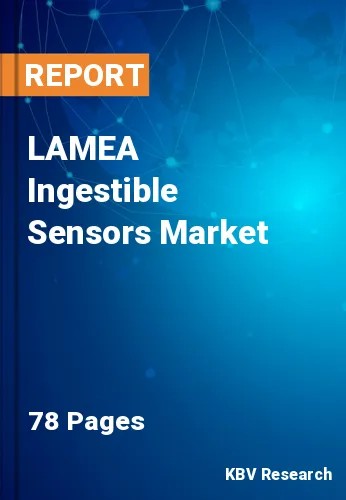The Latin America, Middle East and Africa Ingestible Sensors Market would witness market growth of 12.8% CAGR during the forecast period (2022-2028).
Communication with a broad bandwidth is essential for image-acquiring capsules that must analyze and transmit massive volumes of data. In such capsules, picture quality and frame rate are essential characteristics. Typically, image compression subsystems are employed to reduce the amount of sent data. The 433 MHz commercial communication spectrum and a data throughput of 2.7 Mb/s are utilized for the Given Imaging capsules.
This frequency appears to be one of the most ideal because electromagnetic waves linked with it pass through bodily tissues with minimal propagation loss. (58) Communal transmitter chips are frequently employed in telecommunications, and data encoding is suggested to protect the privacy of patients. Recent efforts have also been made to increase the data transmission rate by boosting the transmission carrier frequency. In addition, a variety of antennas have been demonstrated to be included within capsules.
Utilization of ingestible sensors might revolutionize the diagnostics industry in the coming years. The optimization of these sensors is the subject of several ongoing studies, and it is essential to develop resilience in research endeavours. Monitoring and care of patients during therapy are as crucial as initial medication administration.
Consequently, the usage of smart phones to monitor the health of patients using ingestible sensors would rise in the future. The vendors are selling and promoting their goods under the term Intelligent Pills, which is also used to refer to ingestible sensors. The rising adoption of these sensors would significantly propel the growth of the market in the coming years.
Population aging is a major public-health concern that might have a detrimental influence on South Africa's economy as well as healthcare system if the government fails to appropriately plan for this transition. Numerous potential solutions to maintain healthy aging are being studied and adopted in the region, such as adopting a life-course strategy to vaccination, which includes immunization of the elderly, who face a high risk of severe mortality and morbidity from vaccine-preventable illnesses.
The Brazil market dominated the LAMEA Ingestible Sensors Market by Country in 2021; thereby, achieving a market value of $24.2 Million by 2028. The Argentina market is showcasing a CAGR of 13.4% during (2022 - 2028). Additionally, The UAE market would register a CAGR of 12.5% during (2022 - 2028).
Based on Vertical, the market is segmented into Medical, Sports & Fitness and Others. Based on Component, the market is segmented into Sensor, Wearable Patch/Data Recorder and Software. Based on Sensor Type, the market is segmented into Temperature Senso, Image Sensor, pH Sensor and Pressure Sensor. Based on countries, the market is segmented into Brazil, Argentina, UAE, Saudi Arabia, South Africa, Nigeria, and Rest of LAMEA.
Free Valuable Insights: The Global Ingestible Sensors Market is Predict to reach $1.5 Billion by 2028, at a CAGR of 10.9%
The market research report covers the analysis of key stake holders of the market. Key companies profiled in the report include Medtronic PLC, Olympus Corporation, Check Cap Ltd., Dassault Systemes (Medidata Solutions, Inc.), etectRx™, Inc., H.Q., Inc., Otsuka Pharmaceutical Co., Ltd., CapsoVision, Inc., IntroMedic Co., Ltd. and Chongqing Jinshan Science and Technology Group Co., Ltd.
By Vertical
By Component
By Country
Our team of dedicated experts can provide you with attractive expansion opportunities for your business.

